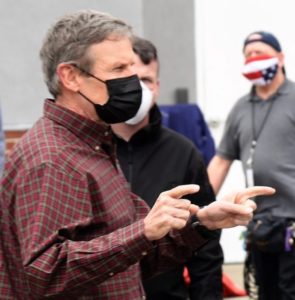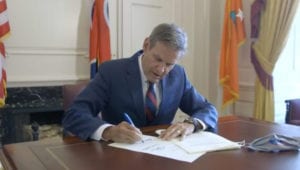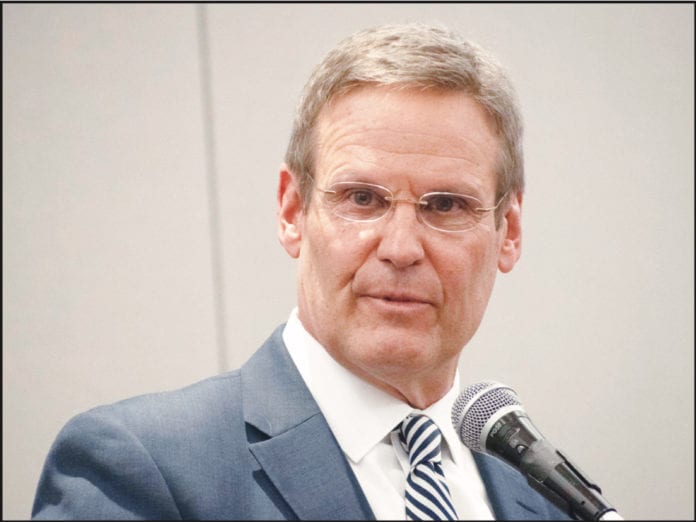Talking with members of the Tennessee Press Association, Gov. Bill Lee this week detailed where he stands on the six-week abortion ban law, removing Confederate monuments from the state Capitol and his assessment of the state’s status regarding multiple elements associated with fighting the coronavirus.
Amid the pandemic and acknowledging the challenges, Lee said his administration was encouraged by some things – particularly noting a level of testing that he said places Tennessee among the leaders regarding testing by states.
“And while that (testing) is not the entire answer to this, it certainly is an important piece of it,” Lee said during a virtual media session on Monday.
Noting that Tennessee just had recorded a record number of new positive cases, Lee pointed out that it coincided with the “largest number of tests we’ve had,” adding a reference to the challenge of lagging test results in Tennessee and the country.
“I remember just six, eight weeks ago, our goal was to get 10,000 tests a day. Now we’re doing 20 and 30,000 a day. …So testing has double and tripled and the labs are having a tough time keeping up, but we’re working on that problem in our unified command group daily to try to stay ahead of that….”
In what he called encouraging news, Lee said, “We are the 16th largest state in the country. And for most of this pandemic, we’ve been about 40th in the country in death rate per capita. Most of the states that have a lower death rate per capita are very rural States, but we hit our nursing home populations early with a strategy that paid dividends. … Those numbers can change and they have gone up, but we still have a relatively low mortality rate in our state.”
Identifying hospital capacity as one of the most important numbers, he acknowledged climbing numbers and said hospital capacity “remains workable. In other words, we have capacity in our hospitals in terms of beds and ICU beds and ventilators. … I’m on calls with the Tennessee Hospital Association on a very frequent and regular basis. And that’s one of the numbers that’s important.”
He pitched the need for Tennesseans to remember the simple things that individuals can do keep the state economy flowing and people safe, such as wearing masks. Lee said he has delegated authority to county mayors so that those counties that have particularly challenging numbers and community spread can implement mask requirements,

“Everywhere I go, I don’t always have to wear a mask, but everywhere I go, I talk about just how important it is that people engage in protecting themselves and their family and their neighbors with masks. I realized that there are areas of our state for which there’s very little spread and there’s not a need to have a string of strong requirements there, but increasingly there are areas in our state that have significant COVID spread.”
Masks are not a political issue, he said, hailing them as “a simple way to help us with all of our other mitigation efforts. It’s a simple way to help and do your part.”
Repeating messages is an essential part of fighting the virus, he said, again plugging the value of Tennessee Pledge as a way that companies can make certain that they’re safe for their patrons and employees.
“We have to continue to challenge businesses, ‘Have you followed the Tennessee Pledge?’ There’s very clear guidelines for a vast number of industries that can participate and help us all keep our economy going. A lot of times I’ll say to folks, the choices that we make will allow us to have the choice to keep our businesses. And that’s what we’re hopeful for.”
Federal Cares Act funding for businesses shut down through the safer-at-home orders targets 31,000 businesses qualified for the funds, he said, noting the need for businesses to have updated tax information in the hands of the Department of Revenue.
Schools, he said, are economic drivers in the community.
“It’s one of the reasons, one of the small reasons why we want to make sure our kids go back to school,” he said. “The biggest reason is because kids learn best in-person at school. There’s a great deal of agreement about that. And our Department of Education is working tirelessly, giving districts the information and the tools that they need to make sure that we can get our kids back into school. Let’s get them into school safely, with social distancing and PPE and rethinking the way the school day works. …
“We’ve also made $81 million in grants to our K-12 and higher education institutions, making sure that they have everything they need to open safely. That’s Care’s money as well.”

Lee’s session with TPA came shortly after he signed the six-month abortion ban bill passed by lawmakers and struck down by a federal court soon after Lee affixed his signature. Saying the measure “protects the life of the unborn in our state,” Lee called the legislation “one of the most important to me.”
“And there’s already been immediate opposition, but in my heart, I believe it’s a really important step.”
During a Q&A session, Lee provided responses to several questions, first fielding an inquiry about the likelihood of high school sports this fall.
Gov. Lee: We are working with the TSSAA (Tennessee Secondary School Athletic Association) and are working aggressively with them. … We asked them to give us what they believe is the safe guidance to practice and to play football and soccer, and then we wanted to make certain that those recommendations by them fit within the broad guidelines that we have going forward. But the short answer is I expect we’ll have those suggestions shortly from the TSSAA. …We just want to make sure it’s very clear to all the schools out there, all the parents out there, what it’s going to look like.
Q: Do we believe that the increase in cases is only from testing? Or is there anything like the protests or the reopening of businesses that are also involved in that?
Gov. Lee: …the increase in the number of cases, probably simply a matter of people relaxing their approach to life, right? I mean, we had stay-at-home orders and everyone was closed up and everyone was very diligent and people weren’t going to work and businesses were closed, but that’s unsustainable. …
So we began the process of opening with the Tennessee Pledge and with guidance for schools. …
“Yes, there’s more patients because people are out and about. But yes, there’s a way to mitigate the spread of that, and that’s by doing those basic things: wear a mask, wash your hands, stay home if you’re sick, and social distance when possible. And all of that together will allow us to maintain livelihoods and protect lives and move forward in a way that works in the midst of a global pandemic until there’s either treatment or a vaccine.
Q: Will you advocate to the State Historical Commission what they should do to either confirm or override what the Capitol Commission voted, especially with (American Civil War) Admiral (David Glasgow) Farragut.
Gov. Bill Lee: “There is a real need for people to know who Admiral Farragut is and who Nathan Bedford Forrest is and what their lives are. And particularly Nathan Bedford Forrest, who’s got a very complicated life that includes being in leadership of KKK, but he also has the end of his life story. That’s a story of redemption that many people point out. It’s a complex history. And I have said all along, we don’t remove history. We don’t white wash history. And by the way, we see a lot of that happening around the country, and this is not what that is. …
But we need to provide context. There was a real question, and I think the Capitol Commission brought this up, as to why those military figures were actually in the Capitol when their sense was that it should be reserved for government leaders that have had business in the Capitol. … So the Capitol Commission believes that the best place for that context to tell the full story is in the state museum right next door, where there will be a display, where there will be an exhibit for important Tennessee military figures, including Farragut and the others….
I mentioned the national story of removing monuments and kind of this mob mentality approach to getting rid of history. I think that’s the wrong approach. And what we’ve done in Tennessee, what the Capitol commission did, is exactly what ought to happen. …
And the Historical Commission is a part of that process. They will take up the exact same issue. It’s filled with appointments that are from one end of the state to the other, that are representative of Tennesseans; they will make that decision based on what they believe is historically appropriate for the state.”
Q: Any additional executive orders that would give local governments more power to react to what’s happening in their communities?
Gov. Bill Lee: Well, I think that the General Assembly will probably look at appropriate ways to address issues like that. After this pandemic, we’ve all learned a lot. I will say this: No, I’m not looking at additional measures beyond what we’ve currently instituted. … What I want to do is encourage people to adopt habits rather than be heavy handed and mandate. …
We’re going to have this virus for some time. Like I said before, you can’t shut down. You can’t mandate things that are unsustainable. And so that’s going to always be my approach. …
Now, we’re going to protect the most vulnerable citizens, like our elderly, with regulations that keep people out of nursing homes, for example. … But there’s a right way to approach this from my view that is not too heavy handed and it gives people information and options, that it reminds people that their decisions have implications.”
(The New Tri-State Defender is a member of the Tennessee Press Association.)



